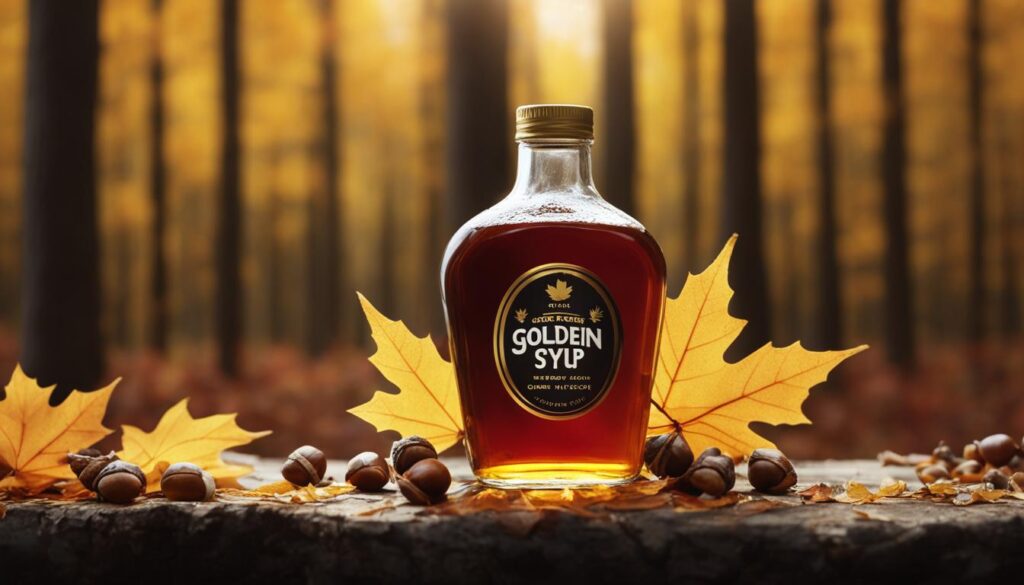Maple syrup is a popular sweetener that many people enjoy, but can dogs have maple syrup? In this article, I will explore the safety of feeding syrup to dogs and discuss alternative sweeteners that are safe for canine consumption. We will also examine the potential health risks and effects on a dog’s digestive system associated with feeding them syrup. It’s important for dog owners to understand the proper guidelines for giving syrup to their pets to ensure their safety and overall health.
Key Takeaways
- Feeding dogs small amounts of maple syrup is generally safe, but moderation is key.
- Some store-bought maple syrups may contain harmful ingredients like xylitol, which is toxic to dogs.
- Excessive consumption of maple syrup can lead to digestive issues and weight gain in dogs.
- Alternative sweeteners such as raw honey, coconut oil, and peanut butter can be safe options for dogs in moderation.
- Consult with a veterinarian before introducing any new food, including syrup, into your dog’s diet.
Understanding Maple Syrup and Its Popularity

Maple syrup is a beloved sweetener that offers a unique flavor and finds itself in a wide variety of culinary applications. Made from the sap of maple trees, this golden syrup is created through a process of boiling the sap until it reaches a desired consistency and taste. Its distinctive flavor, sweet and slightly woody, has captivated the taste buds of people for generations.
Indigenous people in North America have been utilizing maple syrup for centuries. They would tap into the sugar maple trees to extract the sap and then boil it down to create this delicious sweet treat. This traditional practice has been passed down through generations and has contributed to the rich history of maple syrup production.
Aside from its delightful taste, maple syrup also boasts numerous health benefits. It contains essential minerals such as manganese and zinc, which are important for maintaining a healthy body. Additionally, maple syrup contains antioxidants that help reduce inflammation and boost the immune system.
The versatility of maple syrup extends beyond breakfast dishes like pancakes and waffles. It can be used as a natural sweetener in a variety of recipes, whether it’s adding a touch of sweetness to savory marinades and dressings or creating delectable desserts. Its natural flavor profile complements a wide range of ingredients and brings out the best in a dish.
Maple syrup production is a fascinating process that involves tapping into maple trees during the early spring when the sap flows most abundantly. The sap is collected and then gently heated to evaporate the water content, leaving behind the rich and flavorful syrup.
Overall, maple syrup is more than just a sweetener. It is a cultural staple, a source of natural goodness, and a creative ingredient that adds depth and complexity to various dishes. Its unique flavor, history, and health benefits make it a sought-after and cherished ingredient in kitchens around the world.
The Potential Health Risks of Giving Dogs Maple Syrup

While maple syrup can be safe for dogs in moderation, it is essential to be aware of the potential health risks associated with giving them this sweet treat. Some store-bought maple syrups may contain harmful ingredients like xylitol, which is toxic to dogs and can cause drops in blood sugar, liver damage, and seizures. Dogs may experience symptoms such as vomiting, tremors, weakness, or difficulty breathing after consuming maple syrup. Excessive consumption of maple syrup can also lead to digestive issues like upset stomach, diarrhea, and even pancreatitis in dogs. It is important to monitor the amount of maple syrup given to dogs and seek veterinary help if any concerning symptoms occur.
Table: Potential Health Risks of Maple Syrup for Dogs
| Health Risks | Toxic Ingredients in Maple Syrup | Effects on a Dog’s Digestive System | Symptoms of Maple Syrup Ingestion | Harmful Effects of Excessive Maple Syrup Consumption |
|---|---|---|---|---|
| Toxicity | Xylitol | Upset stomach | Vomiting | Pancreatitis |
| Low blood sugar |
|
Diarrhea | Trouble breathing | Digestive issues |
| Liver damage | Weight gain |
It is crucial to be cautious when giving dogs maple syrup and pay attention to the ingredients. Opting for pure, organic maple syrup without xylitol or other harmful additives can help mitigate the risks. If your dog shows any symptoms of maple syrup ingestion, such as vomiting or diarrhea, discontinue giving them maple syrup and consult a veterinarian.
Harmful Ingredients in Maple Syrup for Dogs
When it comes to giving maple syrup to dogs, it is crucial to carefully check the ingredients. Some of the ingredients commonly found in maple syrup can be harmful to dogs and have adverse effects on their health.
One of the main concerns is the high sugar content in maple syrup. Just like in humans, consuming excessive sugar can lead to weight gain and obesity in dogs. Obesity can have severe health consequences for dogs, including joint problems, heart disease, and a decreased lifespan.
Another harmful ingredient to watch out for in maple syrup is xylitol. Xylitol is a sugar substitute commonly used in many food products. While it is safe for humans, xylitol is toxic to dogs even in small amounts. It can cause a sudden drop in blood sugar levels, leading to weakness, seizures, and in severe cases, even death. It is important to be cautious and avoid feeding any maple syrup containing xylitol to your furry friend.
In addition to high sugar content and xylitol, artificial flavorings and preservatives are often present in commercial maple syrups. These additives can cause digestive issues in dogs and may even trigger allergies. Furthermore, preservatives like sulfites can be harmful to dogs, potentially causing adverse reactions such as gastrointestinal upset or respiratory problems.
It is also worth noting that maple syrup provides empty calories for dogs. While it may add flavor to their food, maple syrup lacks essential nutrients and does not contribute to their overall health and well-being. Therefore, it is best to consider alternative sweet treat options for dogs that offer nutritional value.
| Harmful Ingredients | Potential Effects on Dogs |
|---|---|
| High sugar content | – Weight gain and obesity – Dental issues – Increased risk of diabetes |
| Xylitol | – Sudden drop in blood sugar levels – Weakness and seizures – Potential death even in small amounts |
| Artificial flavorings and preservatives | – Digestive issues – Allergic reactions – Gastrointestinal upset or respiratory problems (from sulfites) |
| Empty calories | – No nutritional value – Does not contribute to overall health |
Alternative Sweet Treat Options for Dogs
Instead of maple syrup, there are several safer and healthier alternatives to consider when treating your dog to something sweet. Natural fruits like apples, blueberries, and watermelon can be given as occasional treats, providing vitamins, minerals, and dietary fiber.
Another popular choice is raw honey, which offers natural sweetness along with antioxidants that can support a dog’s digestive system. Coconut oil is another option that not only adds a hint of sweetness but also promotes healthy digestion and a shiny coat. Additionally, peanut butter (without xylitol) can be a delicious and protein-rich treat for dogs.
Remember to introduce new foods gradually and in moderation, and always consult with your veterinarian before making any significant dietary changes for your dog. Each dog’s dietary needs may vary, and your vet can provide personalized recommendations to ensure your dog’s well-being and overall health.
Effects of Maple Syrup on a Dog’s Digestive System

Consuming maple syrup can have various effects on a dog’s digestive system, some of which can be uncomfortable and potentially harmful. It is important for dog owners to be aware of these effects to ensure the well-being of their furry friends.
The high sugar content in maple syrup can disrupt a dog’s normal digestion. Dogs have a limited ability to digest sugar, and consuming too much maple syrup can lead to sugar intolerance. This can result in an upset stomach, diarrhea, and even pancreatitis, a condition that causes inflammation in the pancreas.
Furthermore, excessive consumption of maple syrup can lead to fermentation in the dog’s stomach. Sugar fermentation produces gases, causing bloating and gas accumulation. This can result in discomfort for the dog and may lead to vomiting.
It is also important to note that maple syrup is calorie-dense and can contribute to weight gain in dogs. Excessive weight gain can lead to other health problems such as joint issues and heart disease.
| Effects | Description |
|---|---|
| Sugar Intolerance | Dogs have a limited ability to digest sugar, and consuming too much maple syrup can lead to an upset stomach, diarrhea, and pancreatitis. |
| Fermentation and Gas | Excessive consumption of maple syrup can cause fermentation in a dog’s stomach, resulting in bloating, gas, and potential vomiting. |
| Weight Gain | Maple syrup is calorie-dense, and excessive consumption can contribute to weight gain in dogs, leading to other health problems. |
Given these potential effects, it is essential for dog owners to exercise moderation when sharing human foods like maple syrup with their pets. It is recommended to consult with a veterinarian to determine the appropriate amount of maple syrup for dogs, if any at all.
Safe Maple Syrup Consumption Guidelines for Dogs

While dogs can enjoy the occasional treat of maple syrup, it is important to practice moderation to ensure their safety and overall health. Following these guidelines will help you make informed decisions when it comes to feeding your furry friend this sweet indulgence.
- Limit the amount of maple syrup given to dogs to avoid stomach issues and weight gain.
- A teaspoon or two of pure, organic maple syrup can be safe for most dogs, depending on their size.
- Monitor your dog closely after they consume maple syrup and watch for any signs of discomfort such as vomiting or diarrhea.
- If any symptoms occur, discontinue the maple syrup and seek veterinary advice.
- Remember to prioritize a balanced diet for your dog and use treats like maple syrup sparingly.
- Consult with a veterinarian before introducing any new food into your dog’s diet to ensure their safety and well-being.
When it comes to maple syrup, quality matters. Opt for pure, organic maple syrup that is free from harmful additives and preservatives. This ensures that your dog receives the best possible treat without any unnecessary risks.
It is essential to remember that treats like maple syrup should not replace a balanced diet for dogs. A nutritious and well-balanced diet is crucial for your dog’s overall health and well-being. Consult with your veterinarian to establish a dietary plan that meets your dog’s specific nutritional needs.
| Benefits of Safe Maple Syrup Consumption | Guidelines for Safe Maple Syrup Consumption |
|---|---|
| 1. Occasional sweet indulgence | 1. Limit serving size to a teaspoon or two |
| 2. Adds flavor to treats and meals | 2. Monitor for any signs of discomfort after consumption |
| 3. Contains minerals and antioxidants | 3. Discontinue if vomiting or diarrhea occurs |
| 4. Variety in canine diet | 4. Choose pure, organic maple syrup |
| “A teaspoon or two of organic, pure maple syrup can be a safe and enjoyable treat for your dog, but it is important to monitor their intake and prioritize a balanced diet.” | |
Alternative Sweeteners for Dogs

If you want to give your dog a sweet treat, there are alternative sweeteners that are safe for dogs to consume. Some natural sweeteners that are safe for dogs include raw honey, coconut oil, and peanut butter. These alternatives not only add sweetness to your pup’s diet but also come with added health benefits.
Raw Honey
Raw honey is a natural sweetener that can be safely enjoyed by dogs. It contains antioxidants that soothe the digestive system and boost their overall health. However, it’s important to note that raw honey should be fed in moderation, as it still contains sugar. A teaspoon or two mixed into their food or given as a special treat can be a sweet delight for your furry friend.
Coconut Oil
Coconut oil is not only safe for dogs but also beneficial for their digestion and coat health. It improves digestion by promoting nutrient absorption and can help alleviate symptoms of gastrointestinal issues. Additionally, coconut oil can contribute to a healthy and shiny coat for your pup. Just ensure that you are using unrefined, organic coconut oil and introducing it gradually into their diet, starting with small amounts.
Peanut Butter
Peanut butter is a beloved treat for many dogs, and it can provide them with a dose of healthy fats and protein. It’s important to choose natural peanut butter without added sugars or xylitol, as these can be harmful to dogs. When used in moderation, peanut butter can be a tasty and nutritious addition to their diet. Spread a small amount on a treat or use it to stuff a Kong toy for an interactive and enjoyable experience.
When introducing any new food or treat to your dog’s diet, it’s always advisable to consult with a veterinarian. They can provide personalized advice based on your dog’s specific needs and ensure their safety and well-being.
| Alternative Sweetener | Benefits |
|---|---|
| Raw Honey | – Contains antioxidants that soothe the digestive system – Provides a natural sweetness – Offers potential health benefits |
| Coconut Oil | – Improves digestion and nutrient absorption – Promotes a healthy and shiny coat – Supports overall coat health |
| Peanut Butter | – Contains healthy fats and protein – Can be a tasty and nutritious treat option – Provides mental stimulation when used in interactive toys |
Benefits of Using Alternative Sweeteners for Dogs

Using alternative sweeteners for dogs can provide several benefits. They offer a healthier option compared to traditional sugars, as they contain essential nutrients and have a lower glycemic index. Alternative sweeteners provide natural sweetness without any artificial additives or preservatives, making them a better choice for dogs.
One of the key advantages of alternative sweeteners is that they can be allergy-friendly for dogs with dietary restrictions. Sweeteners like stevia or brown rice syrup are often free of common allergens, making them suitable for dogs with food sensitivities or allergies.
Additionally, alternative sweeteners can contribute to improved digestion in dogs. Many alternative sweeteners, such as honey or coconut oil, contain dietary fiber that aids in digestion and promotes a healthy gut. This can help prevent gastrointestinal issues like constipation or upset stomach.
Moreover, alternative sweeteners can be incorporated into a variety of recipes and treats for dogs, allowing pet owners to enhance the taste and nutrition without compromising on their furry friend’s well-being. Finding the right alternative sweetener that aligns with a dog’s specific dietary needs and preferences is crucial to ensure their overall health and satisfaction.
“Using alternative sweeteners for dogs can provide a healthier option compared to traditional sugars, offering natural sweetness without any additives or preservatives.”
When using alternative sweeteners for dogs, it is important to remember that moderation is key. Even though these sweeteners may offer benefits, they still contain calories and should be given in appropriate portions. It is recommended to consult with a veterinarian to determine the optimal amount of alternative sweeteners for your dog, based on their size, breed, and overall health.
By incorporating alternative sweeteners into a dog’s diet, pet owners can provide a safer and healthier way to satisfy their canine companion’s sweet tooth. From natural sweetness and allergy-friendly options to improved digestion, alternative sweeteners offer a range of benefits that can contribute to a dog’s overall well-being.
Benefits Summary:
- Healthier option than traditional sugars
- Natural sweetness without additives or preservatives
- Allergy-friendly options for dogs with dietary restrictions
- Improved digestion with dietary fiber content
| Sweetener | Key Benefits |
|---|---|
| Raw Honey | Antioxidants, soothing for the digestive system |
| Coconut Oil | Improved digestion, healthy coat |
| Peanut Butter | Protein-rich, healthy fats |
| Stevia | Zero calories, suitable for diabetic dogs |
| Brown Rice Syrup | Allergy-friendly, natural sweetness |
Wrapping Up
In conclusion, as a responsible guide for dog owners, it is important to understand the responsibilities of maintaining a dog’s well-being. While dogs can safely consume small amounts of maple syrup, it is crucial to be aware of the potential risks and effects on their health. Dog owners should carefully monitor the ingredients in maple syrup and opt for natural and organic versions without harmful additives to ensure the safety of their pets.
Moderation is vital when giving dogs maple syrup or any sweet treats, as excessive consumption can lead to digestive issues and weight gain. It is recommended to explore alternative sweeteners that are safe for dogs, such as raw honey, coconut oil, or peanut butter, to provide healthier options and enhance taste and nutrition. Consulting with a veterinarian before introducing any new food into a dog’s diet is always advisable to safeguard their well-being.
Being a responsible dog owner involves a comprehensive approach to dog ownership responsibilities. This includes providing regular exercise, a balanced diet, proper training, regular check-ups, mental stimulation, as well as love and attention. By prioritizing these responsibilities and considering the findings and recommendations outlined in this guide, dog owners can ensure the well-being and happiness of their canine companions for years to come.
FAQ
Can dogs eat maple syrup?
Dogs can safely consume small amounts of maple syrup in moderation. However, it is important to be aware of the potential health risks associated with giving them this sweet treat and to monitor their symptoms closely.
What are the potential health risks of giving dogs maple syrup?
Some potential health risks of giving dogs maple syrup include the presence of harmful ingredients like xylitol, which is toxic to dogs, and the potential for digestive issues and weight gain due to the high sugar content.
Are there alternative sweeteners that are safe for dogs?
Yes, there are alternative sweeteners that are safe for dogs to consume, such as raw honey, coconut oil, and peanut butter. However, it is important to choose natural versions without added sugars or xylitol.
What are the benefits of using alternative sweeteners for dogs?
Alternative sweeteners provide a healthier option compared to traditional sugars, as they contain essential nutrients and have a lower glycemic index. They also offer natural sweetness without any artificial additives or preservatives.
How much maple syrup is safe for dogs to consume?
It is recommended to limit the amount of maple syrup given to dogs and to monitor their symptoms closely. A teaspoon or two of pure, organic maple syrup can be safe for most dogs, depending on their size.






